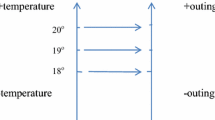Abstract
In relation to the task of making an expedient selection from the available loci within the topical potential that strategic manoeuvring envisages for the argumentation stage, this paper proposes a version of topics, which is both inspired to the traditional doctrine of topics and consistent with the theoretical framing and the methodological tenets that are proper of modern semantics and current theory of argumentation. The argumentative relevance of communication context in its institutionalised and interpersonal components is brought to light. Three main aspects are focussed on: the strong synergy of the topical and the endoxical components in argument construction, the use of topics in analysis and evaluation of arguments and the heuristic function of topics in the production process.
Similar content being viewed by others
References
Aristotelis.: 1959, ‘Ars Rhetorica’, W. D. Ross (ed.), Oxford University Press, Oxford
Aristotelis.: 1949, ‘Categoriae et Liber de Interpretatione’, L. Minio-Paluello (ed.), Oxford University Press, Oxford
Aristotelis.: 1958, ‘Topica et Sophistici Elenchi’, W. D. Ross (ed.), Oxford University Press, Oxford
Cantoni L., N. Di Blas 2006 (2nd edition), Comunicazione. Teoria e Pratiche. Apogeo, Milano
van Eemeren F. H., R. Grootendorst 1992, Argumentation, Communication, and Fallacies. Lawrence Erlbaum Associates, Hillsdale, New Jersey
van Eemeren F. H., R. Grootendorst 2004, A Systematic Theory of Argumentation: The Pragma-dialectical Approach. Cambridge University Press, Cambridge
van Eemeren, F. H. and P. Houtlosser: 2005b, ‘Theoretical Construction and Argumentative Reality: An Analytic Model of Critical Discussion and Conventionalised Types of Argumentative Activity’, in D. Hitchcock and D. Farr (eds.), The Uses of Argument. Proceedings of a Conference at McMaster University, 18–21 May 2005, pp. 75–84
Eemeren F. H. van, P. Houtlosser 2002, Strategic Maneuvering: Maintaining a Delicate Balance in F. H. van Eemeren, P. Houtlosser (eds.), Dialectic and Rhetoric. The Warp and Woof of Argumentation Analysis. Kluwer Academic Publisher, Amsterdam
van Eemeren F. H. and P. Houtlosser: 2005a, ‘Strategic Manoeuvring’, in M. Dascal, F. H. van Eemeren, E. Rigotti, S. Stati and A. Rocci (eds.), Argumentation in Dialogic Interaction, Studies in Communication Sciences, pp. 1–20, special issue, Lugano
Eisenhardt K. M.: 1989, Agency Theory: An Assessment and Review, The Academy of Management Review 14, 57–74
Feteris, E. T.: 1987, ‘The Dialectical Role of the Judge in a Legal Process’, in J. W. Wenzer (ed.), Argument and Critical Practices. Proceedings of the Fifth SCA/AFA Conference on Argumentation, Speech Communication Association, Annandale
Feteris, E. T.: 1993, ‘The Judge as a Critical Antagonist in a Legal Process: A Pragma-dialectical Perspective’, in R. E. McKenow (ed.), Argument and the Postmodern Challenge. Proceedings of the Eight SCA/AFA Conference on Argumentation, Speech Communication Association, Annandale
Greco Morasso, S.: forthcoming, Argumentative and Other Communicative Strategies of the Mediation Practice, PhD thesis, University of Lugano
Greco Morasso, S.: 2007 (in press), ‘Towards a Multidisciplinary Context-Dependent Model of Mediation Practice’, in M. Colombetti (ed.), Communication Sciences as a Multidisciplinary Enterprise. Special Issue of Studies in Communication Sciences
Hispani, P.: 1947, ‘Summulae Logicales’, M. Bochensky (ed.), Marietti, Torino
Hubbel H. M. 1949, Cicero: On inventio – On the Best Kind of Orator – Topics, Harvard University Press, Cambridge, MA
Levinson S. C. 1978, Activity Types and Language’, Pragmatics Microfiche Volume 3, Fiche 3–3, D.1-G.5. Reprinted in Levinson, S.C.: 1979,‘Activity Types and Language, Linguistics 17, 365–399
Mann S. (1997). Agency theory. in J. Garrett (ed.). The Blackwell Enclyclopedia of Management, Second Edition, Blackwell Publishing: Malden
Petty R. E., J. T. Cacioppo 1986, Communication and Persuasion: Central and Peripheral Routes to Attitude Change. Springer, New York
Petty R. E., Cacioppo J. T., Schumann D. T. 1983, Central and Peripheral Routes to Advertising Effectiveness: The Moderating Effect of involvement, Journal of Consumer Research 10, 135–146
Quintiliani, M. F.: 1970, Institutions oratoriae libri duodecim, M. Winterbottom (ed.), Oxford University Press, Oxford.
Rigotti E., A. Rocci 2001, Sens – Non-sens – Contresens. Tentative d’une Définition Explicative, Studies in Communication Sciences 1, 45–80
Rigotti, E. and A. Rocci.: 2007 (in press), ‘Towards a Definition of Communication Context’, in M. Colombetti (ed.), Communication Sciences as a Multidisciplinary Enterprise, Special Issue of Studies in Communication Science
Rigotti, E. and S. Greco: 2006, Topics: The Argument Generator, Argumentum eLearning Module, www.argumentum.ch
Rigotti, E.: 2007 (in press), ‘Can Classical Topics be Revived Within the Contemporary Theory of Argumentation?’, in F. H. van Eemeren, A. J. Blair, F. Snoeck Henkemans and Ch. Willards (eds.), Proceedings of the Sixth Conference of the International Society for the Study of Argumentation, Sic Sat, Amsterdam
Ross, S. A.: 1973, ‘The Economic Theory of Agency: The Principal’s Problem’, The American Economic Review, 63(2), Papers and Proceedings of the Eighty-fifth Annual Meeting of the American Economic Association, May 1973, pp. 134–139
Searle J. R. 1996, The construction of social reality. Penguin, London
Stump E. 2004, Boethius’s ‘De Topicis Differentiis’. Cornell University Press, Ithaca, NY
Author information
Authors and Affiliations
Corresponding author
Additional information
I express to Peter Houtlosser, Corina Andone, Sara Greco Morasso and Andrea Rocci my profound gratitude for their precious suggestions and cordial criticisms.
Rights and permissions
About this article
Cite this article
Rigotti, E. Relevance of Context-bound loci to Topical Potential in the Argumentation Stage. Argumentation 20, 519–540 (2006). https://doi.org/10.1007/s10503-007-9034-2
Published:
Issue Date:
DOI: https://doi.org/10.1007/s10503-007-9034-2




